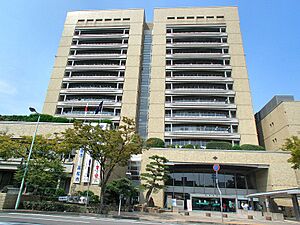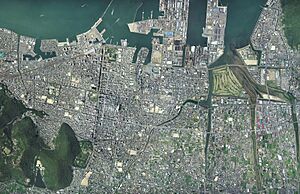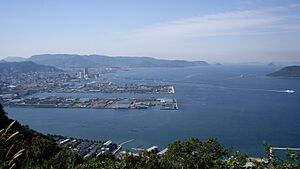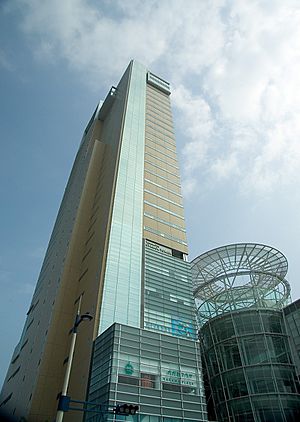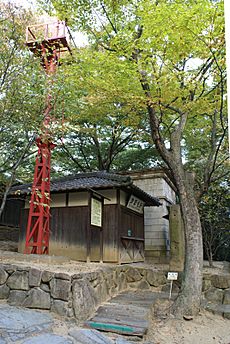Takamatsu facts for kids
Quick facts for kids
Takamatsu
高松市
|
|||||||||||
|---|---|---|---|---|---|---|---|---|---|---|---|
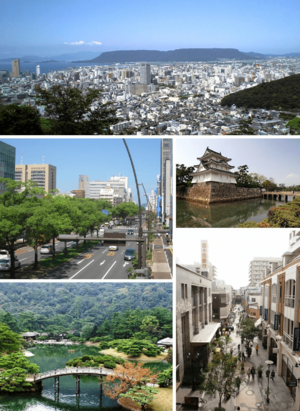
From top left: Central Takamatsu, Chūō dōri street, Takamatsu Castle, Marugame-machi shopping mall, Ritsurin Garden
|
|||||||||||
|
|||||||||||
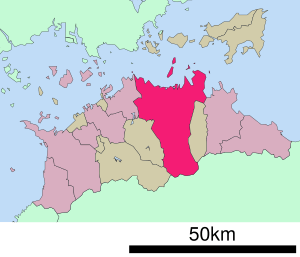 |
|||||||||||
| Country | |||||||||||
| Region | Shikoku | ||||||||||
| Prefecture | Kagawa | ||||||||||
| Area | |||||||||||
| • Total | 375.41 km2 (144.95 sq mi) | ||||||||||
| Population
(November 1, 2022)
|
|||||||||||
| • Total | 414,134 | ||||||||||
| • Density | 1,103.151/km2 (2,857.15/sq mi) | ||||||||||
| Time zone | UTC+09:00 (JST) | ||||||||||
| City hall address | 1-8-15 Banchō, Takamatsu-shi, Kagawa-ken 760-8571 | ||||||||||
| Climate | Cfa | ||||||||||
|
|||||||||||
Takamatsu (高松市 (Takamatsu-shi)) is an important city in Kagawa Prefecture, Japan. It is the capital city of the prefecture. In November 2022, about 414,134 people lived there. The city covers an area of 375.41 square kilometers.
Contents
- Exploring Takamatsu's Location
- Takamatsu's Population Over Time
- A Brief History of Takamatsu
- Takamatsu's Economy and Business
- Learning in Takamatsu: Schools and Universities
- Getting Around Takamatsu: Transportation
- Fun Things to See and Do in Takamatsu
- Takamatsu's International Connections
- Takamatsu in Books and Stories
- Famous People from Takamatsu
- See also
Exploring Takamatsu's Location
Takamatsu is located in the middle of Kagawa Prefecture. This prefecture is on the island of Shikoku. The city sits on the Takamatsu Plain, which is mostly a gentle slope.
The northern part of Takamatsu faces the Seto Inland Sea. Here, you'll find the city's main areas around Takamatsu Port. The western side has land formed by the Koto River. The eastern side is a flat area created by the Kasuga and Shinkawa rivers.
In the northeast, there's Yashima. This is a flat-topped plateau that sticks out into the Seto Inland Sea. A famous battle from the Genpei War happened here. Some parts of Takamatsu are even inside the beautiful Setonaikai National Park. The city also includes several small islands in the Seto Inland Sea.
Neighboring Towns and Cities
Takamatsu shares borders with several other places:
- In Kagawa Prefecture:
- Ayagawa
- Honnō
- Miki
- Sakaide
- Sanuki
- In Tokushima Prefecture:
- Mima
Takamatsu's Climate
Takamatsu has a humid subtropical climate. This means it has hot, humid summers and cool winters. Rain falls throughout the year, but it rains the most from May to September.
| Climate data for Takamatsu (1991−2020 normals, extremes 1941−present) | |||||||||||||
|---|---|---|---|---|---|---|---|---|---|---|---|---|---|
| Month | Jan | Feb | Mar | Apr | May | Jun | Jul | Aug | Sep | Oct | Nov | Dec | Year |
| Record high °C (°F) | 18.9 (66.0) |
24.0 (75.2) |
25.5 (77.9) |
30.9 (87.6) |
32.6 (90.7) |
36.5 (97.7) |
38.2 (100.8) |
38.6 (101.5) |
37.6 (99.7) |
34.0 (93.2) |
26.6 (79.9) |
21.2 (70.2) |
38.6 (101.5) |
| Mean daily maximum °C (°F) | 9.7 (49.5) |
10.5 (50.9) |
14.1 (57.4) |
19.8 (67.6) |
24.8 (76.6) |
27.5 (81.5) |
31.7 (89.1) |
33.0 (91.4) |
28.8 (83.8) |
23.2 (73.8) |
17.5 (63.5) |
12.1 (53.8) |
21.1 (70.0) |
| Daily mean °C (°F) | 5.9 (42.6) |
6.3 (43.3) |
9.4 (48.9) |
14.7 (58.5) |
19.8 (67.6) |
23.3 (73.9) |
27.5 (81.5) |
28.6 (83.5) |
24.7 (76.5) |
19.0 (66.2) |
13.2 (55.8) |
8.1 (46.6) |
16.7 (62.1) |
| Mean daily minimum °C (°F) | 2.1 (35.8) |
2.2 (36.0) |
5.0 (41.0) |
9.9 (49.8) |
15.1 (59.2) |
19.8 (67.6) |
24.1 (75.4) |
25.1 (77.2) |
21.2 (70.2) |
15.1 (59.2) |
9.1 (48.4) |
4.3 (39.7) |
12.8 (55.0) |
| Record low °C (°F) | −7.7 (18.1) |
−6.0 (21.2) |
−4.4 (24.1) |
−2.4 (27.7) |
2.8 (37.0) |
7.5 (45.5) |
15.3 (59.5) |
15.8 (60.4) |
9.4 (48.9) |
2.0 (35.6) |
−1.8 (28.8) |
−5.3 (22.5) |
−7.7 (18.1) |
| Average precipitation mm (inches) | 39.4 (1.55) |
45.8 (1.80) |
81.4 (3.20) |
74.6 (2.94) |
100.9 (3.97) |
153.1 (6.03) |
159.8 (6.29) |
106.0 (4.17) |
167.4 (6.59) |
120.1 (4.73) |
55.0 (2.17) |
46.7 (1.84) |
1,150.1 (45.28) |
| Average snowfall cm (inches) | 0 (0) |
1 (0.4) |
0 (0) |
0 (0) |
0 (0) |
0 (0) |
0 (0) |
0 (0) |
0 (0) |
0 (0) |
0 (0) |
0 (0) |
1 (0.4) |
| Average precipitation days (≥ 0.5 mm) | 7.5 | 8.0 | 10.8 | 10.1 | 9.4 | 11.5 | 10.5 | 7.9 | 10.5 | 9.3 | 7.8 | 7.9 | 111.3 |
| Average relative humidity (%) | 63 | 63 | 62 | 62 | 64 | 72 | 73 | 70 | 72 | 70 | 69 | 66 | 67 |
| Mean monthly sunshine hours | 141.4 | 143.8 | 175.0 | 194.5 | 210.1 | 158.2 | 191.8 | 221.2 | 159.6 | 164.6 | 145.5 | 142.7 | 2,046.5 |
| Source: Japan Meteorological Agency | |||||||||||||
| Climate data for Kōnan, Takamatsu (2003−2020 normals, extremes 2003−present) | |||||||||||||
|---|---|---|---|---|---|---|---|---|---|---|---|---|---|
| Month | Jan | Feb | Mar | Apr | May | Jun | Jul | Aug | Sep | Oct | Nov | Dec | Year |
| Record high °C (°F) | 16.6 (61.9) |
22.8 (73.0) |
25.2 (77.4) |
29.6 (85.3) |
31.9 (89.4) |
34.8 (94.6) |
36.0 (96.8) |
37.8 (100.0) |
35.5 (95.9) |
31.9 (89.4) |
26.1 (79.0) |
19.4 (66.9) |
37.8 (100.0) |
| Mean daily maximum °C (°F) | 8.2 (46.8) |
9.3 (48.7) |
13.1 (55.6) |
18.8 (65.8) |
23.7 (74.7) |
26.4 (79.5) |
30.2 (86.4) |
31.7 (89.1) |
27.5 (81.5) |
21.9 (71.4) |
16.3 (61.3) |
10.5 (50.9) |
19.8 (67.6) |
| Daily mean °C (°F) | 4.1 (39.4) |
4.9 (40.8) |
8.0 (46.4) |
13.3 (55.9) |
18.3 (64.9) |
21.8 (71.2) |
25.6 (78.1) |
26.7 (80.1) |
22.8 (73.0) |
17.3 (63.1) |
11.8 (53.2) |
6.5 (43.7) |
15.1 (59.2) |
| Mean daily minimum °C (°F) | 0.4 (32.7) |
0.7 (33.3) |
3.0 (37.4) |
7.9 (46.2) |
13.0 (55.4) |
17.7 (63.9) |
22.0 (71.6) |
22.8 (73.0) |
19.1 (66.4) |
13.3 (55.9) |
7.7 (45.9) |
2.7 (36.9) |
10.9 (51.5) |
| Record low °C (°F) | −5.6 (21.9) |
−5.5 (22.1) |
−3.6 (25.5) |
−1.1 (30.0) |
2.9 (37.2) |
9.7 (49.5) |
16.3 (61.3) |
15.9 (60.6) |
11.0 (51.8) |
4.6 (40.3) |
−0.4 (31.3) |
−4.9 (23.2) |
−5.6 (21.9) |
| Average precipitation mm (inches) | 41.0 (1.61) |
54.8 (2.16) |
84.8 (3.34) |
77.8 (3.06) |
105.5 (4.15) |
160.7 (6.33) |
193.2 (7.61) |
150.1 (5.91) |
214.4 (8.44) |
148.4 (5.84) |
64.4 (2.54) |
59.0 (2.32) |
1,353.9 (53.30) |
| Average precipitation days (≥ 1.0 mm) | 6.6 | 8.4 | 10.1 | 9.8 | 8.3 | 11.1 | 10.5 | 8.7 | 10.2 | 8.5 | 8.0 | 7.9 | 108.1 |
| Source: Japan Meteorological Agency | |||||||||||||
Takamatsu's Population Over Time
According to Japan's census data, Takamatsu had 417,496 people in 2020. The city has been counting its population since 1920.
| Historical population | ||
|---|---|---|
| Year | Pop. | ±% |
| 1920 | 186,963 | — |
| 1925 | 199,141 | +6.5% |
| 1930 | 213,001 | +7.0% |
| 1935 | 222,545 | +4.5% |
| 1940 | 219,082 | −1.6% |
| 1945 | 246,809 | +12.7% |
| 1950 | 269,159 | +9.1% |
| 1955 | 284,684 | +5.8% |
| 1960 | 295,178 | +3.7% |
| 1965 | 307,549 | +4.2% |
| 1970 | 327,170 | +6.4% |
| 1975 | 360,024 | +10.0% |
| 1980 | 386,547 | +7.4% |
| 1985 | 401,020 | +3.7% |
| 1990 | 406,853 | +1.5% |
| 1995 | 412,626 | +1.4% |
| 2000 | 416,680 | +1.0% |
| 2005 | 418,125 | +0.3% |
| 2010 | 419,429 | +0.3% |
| 2015 | 420,748 | +0.3% |
| 2020 | 417,496 | −0.8% |
| Takamatsu population statistics | ||
A Brief History of Takamatsu
The area where Takamatsu is now was once part of an old region called Sanuki Province. During the Heian period and Kamakura period, Takamatsu was a key port. It was the closest port to Honshu from Shikoku island. This made it an important stop for travelers and pilgrims. Many pilgrims were on their way to the Kotohira Shrine.
In the Sengoku period, a leader named Ikoma Chikamasa built the first Takamatsu Castle in 1588. Later, in 1642, Matsudaira Yorishige became the ruler of the Takamatsu area. His family continued to rule until the Meiji restoration.
The modern city of Takamatsu was officially created on February 15, 1890. The old castle tower, which was a symbol of the city, was destroyed during the Meiji period. Over time, Takamatsu grew bigger by adding nearby villages and towns.
During World War II, Takamatsu was a target for bombing. This was because it was a major hub for trains and roads on Shikoku island. It also had industries that helped with the war. On July 3, 1945, many bombers attacked Takamatsu. They destroyed most of the city and many people lost their lives.
After the war, the city quickly rebuilt itself. It continued to grow and expand its borders. On April 1, 1999, Takamatsu was named a core city. This gave it more power to make its own local decisions.
Later, Takamatsu merged with several other towns. This happened on September 26, 2005, when Shionoe joined. Then, on January 10, 2006, five more towns became part of Takamatsu. These were Aji, Mure, Kagawa, Kōnan, and Kokubunji.
Takamatsu's Economy and Business
Takamatsu is the biggest city in Shikoku. Many national companies have their branch offices here. These offices play a big part in the city's economy. Most of the Japanese government's offices for Shikoku are also located in Takamatsu.
In 2004, the Symbol Tower was finished. This tall building is a new symbol for Takamatsu. It is located in the Sunport area of the city. The Symbol Tower is the tallest building in Takamatsu. Right next to it is the JR Clement Hotel, another tall building. The Sunport Takamatsu area is also connected to the city's ports.
Some companies that have their main offices in Takamatsu include:
- Shikoku Railway Company (a train company)
- Shikoku Shimbun (a newspaper company)
- Tadano Limited (a company that makes cranes and other heavy equipment)
Learning in Takamatsu: Schools and Universities
Takamatsu has many schools for children and young adults. The city government runs 48 public elementary schools and 22 public middle schools. There is also one public high school run by the city.
The Kagawa Prefectural Board of Education operates eight public high schools. They also run one school that combines middle and high school levels. In addition, Takamatsu has private schools: two combined middle/high schools and seven private high schools. There is also one national elementary, one national middle, and one national high school. The Kagawa Prefectural government also has three special education schools for students with disabilities.
Universities in Takamatsu
If you want to go to college, Takamatsu has several universities:
- Kagawa Prefectural College of Health Sciences
- Kagawa University
- Takamatsu University
Getting Around Takamatsu: Transportation
The main train station in Takamatsu is Takamatsu Station. It is run by JR Shikoku. From here, you can take trains to other places in Shikoku. You can also go to Okayama Station on Honshū island by crossing the Seto-Ōhashi Bridge.
The private Kotoden railway system helps people travel around much of Takamatsu. Its main hub is Kawaramachi Station, which is also near a department store. Takamatsu-Chikko Station is close to Takamatsu Station. You can use a special card called IruCa to pay for rides on Kotoden buses and trains.
Airports Near Takamatsu
- Takamatsu Airport
Railways in Takamatsu
![]() Shikoku Railway Company - Yosan Line
Shikoku Railway Company - Yosan Line
- Takamatsu - Kōzai - Kinashi - Hashioka - Kokubu
![]() Shikoku Railway Company - Kōtoku Line
Shikoku Railway Company - Kōtoku Line
- Sanuki-Mure - Yakuriguchi - Furutakamatsu-Minami - Yashima - Kitachō - Ritsurin - Ritsurin-Kōen-Kitaguchi - Shōwachō - Takamatsu
![]() Takamatsu-Kotohira Electric Railroad - Kotoden Kotohira Line
Takamatsu-Kotohira Electric Railroad - Kotoden Kotohira Line
- Takamatsu-Chikkō- Kataharamachi - Kawaramachi - Ritsurin-Kōen - Sanjō - Fuseishi - Ōta - Busshōzan - Kūkō-dōri - Ichinomiya - Enza - Okamoto
![]() Takamatsu-Kotohira Electric Railroad - Kotoden Nagao Line
Takamatsu-Kotohira Electric Railroad - Kotoden Nagao Line
- (Takamatsu-Chikkō - Kataharamachi) - Kawaramachi - Hanazono - Hayashimichi - Kita-Higashiguchi - Motoyama - Mizuta - Nishi-Maeda -Takata
![]() Takamatsu-Kotohira Electric Railroad - Kotoden Shido Line
Takamatsu-Kotohira Electric Railroad - Kotoden Shido Line
- Kawaramachi - Imabashi - Matsushima-Nichōme - Oki-Matsushima - Kasugagawa - Katamoto - Kotoden-Yashima - Furu-Takamatsu - Yakuri - Rokumanji - Ōmachi - Yakuri-Shinmichi - Shioya - Fusazaki - Hara
Highways Connecting Takamatsu
 Takamatsu Expressway
Takamatsu Expressway National Route 11
National Route 11 National Route 30
National Route 30 National Route 32
National Route 32 National Route 193
National Route 193 National Route 377
National Route 377 National Route 436
National Route 436 National Route 492
National Route 492
Ports in Takamatsu
- Port of Takamatsu
Fun Things to See and Do in Takamatsu
Takamatsu has many interesting places to visit:
- Ritsurin Garden: This is a beautiful Japanese garden. The Japanese government has named it a Special Place of Scenic Beauty.
- Takamatsu Castle: This castle is special because it uses seawater in its moat. The old castle tower has been rebuilt and is now open for visitors.
- Yashima plateau: This area has many sightseeing spots. At the bottom of the mountain, you can visit Shikoku Mura. This is an open-air museum that shows parts of the region's history and culture. On the mountain itself is Yashima-ji, which is temple number 84 on the Shikoku pilgrimage. At the top, there's a viewing deck with amazing views of the Seto Inland Sea.
- Islands of the Seto Inland Sea: Takamatsu is a great starting point to visit nearby islands. These include Megijima, Ogijima, Naoshima, Teshima, and Shōdoshima. Since 2010, Takamatsu and these islands have hosted the Setouchi Triennale. This is a modern art festival with many outdoor art displays by artists from all over the world.
Sports Teams in Takamatsu
Takamatsu is home to several sports teams:
- Kagawa Five Arrows (Basketball, B.League)
- Kagawa Ice Fellows (Ice Hockey)
- Kagawa Olive Guyners (Baseball)
- Kamatamare Sanuki (Football)
Takamatsu's International Connections
Takamatsu has special relationships with cities around the world.
Twin Cities
Takamatsu is connected as a twin city with:
 St. Petersburg, United States
St. Petersburg, United States Tours, France
Tours, France
Friendship Cities
Takamatsu also has friendship agreements with:
 Nanchang, China (since 1990)
Nanchang, China (since 1990)
Takamatsu in Books and Stories
- Takamatsu is the main place where the story of Haruki Murakami's novel Kafka on the Shore happens.
- The naval commander Tameichi Hara was born in Takamatsu in 1900. He wrote about his childhood there in his book Japanese Destroyer Captain.
- Takamatsu is the main setting for the manga and anime series Poco's Udon World.
Famous People from Takamatsu
Many well-known people, including actors, musicians, and athletes, come from Takamatsu. Here are a few:
- Ema Fujisawa (actor, born 1982)
- Shinichiro Furumoto (politician, born 1956)
- Yoshihiro Hamaguchi (Olympic athlete, 1926-2011)
- Takuya Hirai (politician, born 1958)
- Ikuko Kawai (musician and composer, born 1968)
- Kan Kikuchi (writer and publisher, 1888-1948)
- Akiko Kinouchi (actor, born 1981)
- Makoto Kitano (soccer player, born 1967)
- Kenji Kobayashi (shogi player, born 1957)
- Akihito Kondo (baseball player, 1938-2019)
- Yasuhiro Konishi (karateka, 1893-1983)
- Bukichi Miki (politician, 1884-1956)
- Ryuki Miki (tennis player, 1904-1967)
- Lu Wanyao (golfer, born 1996)
- Yoshiro Maeda (mixed martial artist, born 1981)
- Shigeru Makino (baseball player, 1928-1984)
- Ryuya Matsumoto (baseball player, born 1994)
- Kojin Nakakita (sledge hockey coach, born 1963)
- Futoshi Nakanishi (baseball player, born 1933)
- Kiyotaka Nanbara (comedian and TV personality, born 1965)
- Ayano Ninomiya (violinist, born 1971)
- Tetsuya Noguchi (artist, born 1980)
- Junya Ogawa (politician, born 1971)
- Kentaro Sonoura (politician, born 1972)
- Mikuru Suzuki (darts player, born 1982)
- Daisuke Tsuda (singer and drummer, born 1977)
- Ayako Uehara (pianist, born 1980)
- Emiko Uematsu (politician, born 1967)
- Satoru Uyama (fencer, born 1991)
See also
 In Spanish: Takamatsu para niños
In Spanish: Takamatsu para niños
 | Kyle Baker |
 | Joseph Yoakum |
 | Laura Wheeler Waring |
 | Henry Ossawa Tanner |





